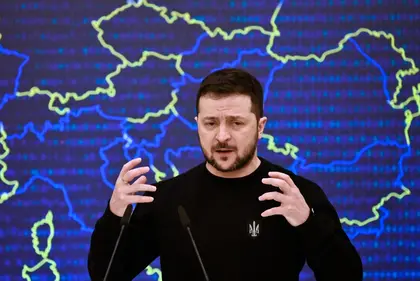Western allies pledged precision rockets and missile systems to Ukraine on Friday, after President Volodymyr Zelensky called for sophisticated weapons to help retain control of the embattled eastern city of Bakhmut.
The European Union also agreed to introduce price caps on Russian petroleum products to try to further limit Russian President Vladimir Putin's war chest by targeting his key exports.
JOIN US ON TELEGRAM
Follow our coverage of the war on the @Kyivpost_official.
The announcements came shortly after Zelensky told a summit with EU leaders in Kyiv: "No one will surrender Bakhmut. We will fight as long as we can.
"If weapon (deliveries) are accelerated – namely long-range weapons – we will not only not withdraw from Bakhmut, we will begin to de-occupy Donbas," he said of the eastern region of Ukraine.
The United States on Friday announced a new $2.2-billion package of arms and munitions, which the Pentagon said included a new rocket-propelled precision bomb that could nearly double Kyiv's strike range against Russian forces.
The ground-launched small-diameter bombs, which can fly up to 150 kilometres (93 miles), could threaten key Russian supply lines, arms depots and air bases far behind the front lines.
They potentially give Kyiv's forces the ability to strike anywhere in the Russian-occupied Donbas, Zaporizhzhia and Kherson regions, as well as the northern part of occupied Crimea. France and Italy will deliver mobile surface-to-air missile systems, the French defence ministry said, in response to an urgent request from Kyiv to help protect "civilian populations and infrastructure from Russian air attacks".

EU Transfers €1.5 Bln Raised From Russian Assets for Ukraine
The systems, called MAMBA or SAMP, are a vehicle-mounted battery of medium-range missiles designed to offer protection from airborne threats such as missiles and manned or unmanned aircraft.
Ukrainian Defence Minister Oleksiy Reznikov, who had requested the weapons, tweeted his gratitude, saying the systems would "help us save thousands of lives" from Russian attacks.
Kyiv is also asking for fighter jets. It has already secured promises from the West for deliveries of modern battle tanks and, after months of hesitation, Germany authorised the delivery of Leopard 1 tanks.
In Brussels, the EU, the Group of Seven industrialised countries and Australia agreed to cap the price of Russian refined oil products to accompany an embargo on ship deliveries of the products that comes into force on Sunday.
Already in December, the EU imposed an embargo on Russian crude oil coming into the bloc by sea and – with its G7 partners – imposed a $60-per-barrel cap on Russian crude exports to other parts of the world.
The new embargo and price caps starting Sunday will target Russian refined oil products such as petrol, diesel and heating fuel arriving on ships.
The Kremlin warned that the measures would destabilise world markets. European Commission president Ursula von der Leyen estimated this week that the crude oil price cap costs Moscow around 160 million euros ($170 million) daily.
At the Kyiv summit, the EU praised Ukraine's "considerable efforts" to start the reforms needed for joining the bloc, but urged it to go further.
Corruption is a key European concern. Ukraine has widened efforts to tackle it, with raids this week on an oligarch with political connections and a former interior minister.
Zelensky, who is pressing for speedy EU accession, suggested Friday that talks could begin this year.
"What exactly did we agree upon today?" Zelensky said in his regular evening address. "There is an understanding that it is possible to start negotiations on Ukraine's membership in the European Union this year."
But the path to joining the EU could take years. Von der Leyen cautioned that the process was merit-based and there could be "no rigid timelines" on either negotiations or membership.
For now, the EU says it will do more to divert Russia's frozen assets for use compensating Ukraine for damage inflicted since the invasion.
Brussels also plans to roll out a new package of sanctions on the first anniversary of the invasion, February 24.
There was no let-up in fighting in Bakhmut, the front line of a prolonged battle between Ukrainian and Russian forces.
Throughout Friday morning, AFP journalists heard a steady exchange of small-arms fire and the pounding of mortar shells to and from Russian positions.
An American humanitarian medic was killed in the city when his evacuation vehicle was hit by a missile, according to Global Outreach Doctors, with whom he was working.
The 33-year-old victim, Pete Reed, was a former US Marine Corps rifleman who also worked as a paramedic, according to the organisation's founder, Andrew Lustig.
Several others were reportedly hurt in the strike. Local man Oleksandr Tkachenko, 65, said it was "clear" the car, which was destroyed, was not a military target.
Residents trying to rescue the occupants had also come under attack, he added.
You can also highlight the text and press Ctrl + Enter






